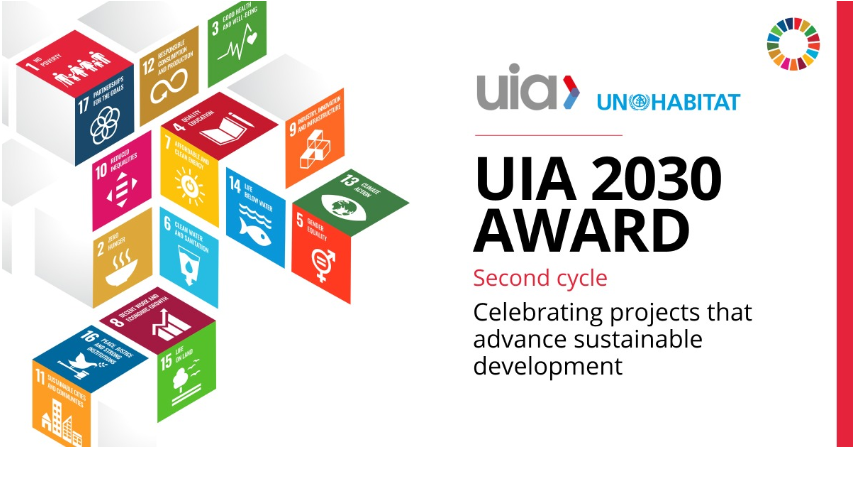
The International Union of Architects, in collaboration with UN-Habitat, has announced the launch of the second cycle of the UIA 2030 Award. This biennial award promotes the work of architects contributing to the delivery of the UN 2030 Agenda for Sustainable Development together with the New Urban Agenda.
The first cycle of the Award gathered 125 projects from 40 countries and the final results were announced on 28 June 2022 in Katowice, Poland, during the World Urban Forum (WUF11).
Synchronised with the World Urban Forum (WUF), the award invites all architects around the world to submit entries for built projects that demonstrate design quality and have made significant contributions towards achievement of the Sustainable Development Goals (SDGs).
The award will be run in two stages. Stage 1 submissions will be assessed on a regional basis, reflecting each of the five UIA Regions. Between one and three Regional Finalists in each Award Category will go to Stage 2. The location of the project will determine the region in which it is to be assessed.
Participation is open to all architects worldwide and the submission text must be in English.
Projects must be submitted in English on the UIA awards platform. Questions must be sent to the email address in the Award brief, before the deadline of 5 February 2024.
Submit your project
Keywords : Sustainability
THEME AND OBJECTIVES
The UIA is committed to supporting delivery of the 17 SDGs, especially SDG11, ‘To make cities and human settlements inclusive, safe, resilient and sustainable’.
Awards will be made for built projects which demonstrate design quality and have made significant contributions towards achievement of the Sustainable Development Goals in each of the 6 following categories:
Sustainable Development Goal 3, Good Health and Well-being
1. Good health and well-being: This category will recognise a project which can demonstrate having significantly contributed to the promotion of healthy lives and well-being, such as a reduction in communicable diseases, consistent with the principles underpinning Target 3.3 of SDG 3.
Sustainable Development Goal 11, Sustainable Cities and Communities
2. Adequate, safe and affordable housing: This category will recognise a project which has significantly contributed to the provision of accessible, adequate, safe and affordable housing, urban regeneration and/or slum upgrading consistent with the principles underpinning Target 11.1 of SDG11.
3. Access to safe, accessible, and sustainable public transport: This category will recognise a project which, by virtue of siting, design, density etc, has significantly contributed to the provision of safe, accessible, and sustainable public transport (such as Transport Oriented Development and/or neighbourhood planning), consistent with the principles underpinning Target 11.2.1 of SDG11
4. Access to green and public space: This category will recognise a project which has significantly contributed to the provision of access to safe, inclusive and accessible green and public space for all, consistent with the principles underpinning Target 11.7 of SDG11.
5. Adaptation to climate change and resilience to disasters: This category will recognise a project which can demonstrate having significantly contributed to adaption to climate change and/or resilience to disasters, consistent with the principles underpinning Target 11b of SDG11.
Sustainable Development Goal 15, Life on Land
6. Promotion, restoration and sustainable use of ecosystems: This category will recognise a project which, either through its siting, design or construction, significantly contributes to the promotion, restoration and/or sustainable use of ecosystems consistent with the principles underpinning SDG15.
KEY CRITERIA
Entries will be judged on the extent to which they can evidence having addressed the principles underpinning the relevant SDG targets and any appropriate aspects of the New Urban Agenda. All entries will also be judged on the extent to which they meet the following criteria:
Submissions are invited from clients (with the approval of their architects) and by architects who must be the authors of the work to which the submission refers. Architects eligible to participate are, on the day of the announcement of the award and pursuant to the legal provisions of their country of residence, entitled to use the occupational title “Architect”.
Members of the Organiser’s team, the jury and their associates, business partners, employees, students and close relatives are not allowed to submit entries. Any person who has been involved in the preparation of the award/prize is not eligible to participate or to assist any participant.
Submissions should be for built projects that have been completed and occupied for a period of between 1-5 years prior to date of submission.
JURY MEMBERS
Key Dates
8 Jan 2024: Award launch
5 Feb 2024: Deadline for questions
12 Feb 2024: Deadline for answers
12 April 2024: Deadline for submission of Stage 1 entries
31 May 2024: Shortlisted Stage 1 entries informed
23 Aug 2024 Deadline for submission of State 2 entries
4 Nov 2024 Results announcement at WUF 12
For more information, please visit on UIA website.